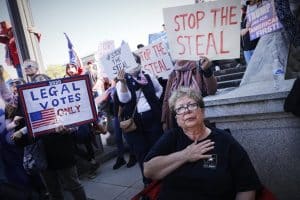SACRAMENTO, CA – In what is being called a “significant victory” for inmates convicted of sex crimes, the California Supreme Court has ruled that those convicted of nonviolent sex offenses may be eligible for early parole.
The court ruled Monday that the state cannot categorically exclude nonviolent sex offenses from early parole consideration. The ruling made clear that violent felony sex offenders are not included in the decision.
There is no such thing as a “nonviolent sex crime.” 😐 https://t.co/ZAnnAehuBq
— M.E.N.D. Family Court ⚖️ (@MENDFamilyCourt) December 28, 2020
The court also ruled that the early release decision must be based on the inmate’s current conviction, not a prior one. Chief Justice Tani Cantil-Sakauye wrote in the unanimous decision:
“The initiative’s language provides no indication that the voters intended to allow the (Corrections) Department to create a wholesale exclusion from parole consideration based on an inmate’s sex offense convictions when the inmate was convicted of a nonviolent felony.
“The Board of Parole Hearings may consider an inmate’s prior or current sex offense convictions when evaluating the inmate’s suitability for parole, (but it may not deny) even the mere possibility of parole to an entire category of inmates.”
Honestly, I can understand wanting to parole nonviolent drug crimes, however sex crimes are especially heinous. Especially when you find out that child porn is classified as nonviolent. https://t.co/Zivb8m65ME #FoxNews
— Cheyenne Vaughn (@cheyenne6698) December 29, 2020
The ruling comes out of a case filed by, among others, Sacramento attorney Janice Bellucci. She argued before the court as the Executive Director of the Alliance for Constitutional Sex Offense Laws (ACSOL). According to its website, ACSOL is dedicated to protecting the civil rights of sex offender registrants and their families.
Bellucci said in a statement issued by ACSOL:
“This is a significant victory for registrants who are currently in custody. As the result of this decision, all registrants in custody who have been convicted of a nonviolent sex offense must be provided early consideration for parole.”
The court’s ruling overturns regulations in place by the California Department of Corrections and Rehabilitation (CDCR) that prohibited all sex offender registrants from benefiting from Proposition 57, primarily the benefit allowing considered for early parole.
Nice work California voters. This was part of the “safe neighborhoods” prop 57 that none of you bothered to read because the title sounded good. And all the car break-ins in SF? Thx for that too. https://t.co/yeAXm5bs6D
— winotone (@winotone) December 29, 2020
Proposition 57 was an initiated ballot approved by Californian voters on November 8, 2016. The initiative amended the state’s constitution to provide that anyone “convicted of a nonviolent felony offense and sentenced to state prison shall be eligible for parole consideration after completing the full term of his or her primary offense.”
The proposition allows for parole consideration for nonviolent felons. The measure allows parole boards to release these inmates once they have served their sentence for their primary criminal offense.
Prior to Proposition 57, offenders often were ineligible for parole for longer periods while they served time for sentencing enhancements, such as repeat offenders.
The proposition was passed with 64.46% of the vote.
Prosecutors had warned voters before Prop. 57’s passage that the proposal was “so sloppily and poorly drafted” it would “wreak havoc on public safety.” https://t.co/ps6zIImLRt
— Maoxinxin (@Maoxinxin2) December 29, 2020
Former Governor Jerry Brown, who supported Proposition 57, has repeatedly said he and other proponents never intended sex offenders to be covered. The high court disagreed:
“(Proposition 57) is not ambiguous concerning its scope regarding offenders who were previously convicted of a registerable sex offense or who are currently convicted of a registerable sex offense that the (Corrections) Department has itself defined as nonviolent.”
Violent offenses in California include offenses such as rape, sodomy, and continuous sexual abuse of a child. Other offenses not labeled as violent include incest, possession of child pornography, pimping, and indecent exposure.
Ventura County District Attorney Greg Totten reacted to the ruling:
“I hate to say I told you so. This is something we warned the proponents (of Proposition 57) about. They largely dismissed it as posturing.”
Calculating how many prisoners this ruling will affect is difficult. The determination of which inmates are violent versus nonviolent is made by CDCR, not by statute. The court put the number of inmates now eligible for early parole at 4,400. Of the 22, 400 inmates required to register as sex offenders based on current or prior convictions, more than 18,000 are serving time for violent offenses, making them ineligible, according to the court.
Thousands of California sex offenders eligible for early parole according to state Supreme Court
The state definition of “violent offenses” leaves out many other crimes such as pimping, incest, indecent exposure & possessing child pornography.https://t.co/eyJW9LE5Td
— HaveWeAllGoneMad (@HaveWeAllGoneM1) December 29, 2020
Attorney Bellucci disagreed. She said that the figure is too low and that she is concerned the CDCR will attempt to broadly define violent crime to exclude all sex crimes when they adjust their regulations for the new ruling.
Bellucci said she would fight “like bloody hell” to prevent the CDCR from taking steps to circumvent the ruling’s intended outcome.
CDCR spokeswoman Dana Simas pointed out the court’s statement in its decision that the ruling did not categorically mean sex offenders would be paroled. Simas said:
“(The ruling) will have no impact on the existing exclusion of individuals convicted of violent felony sex offenses from this parole process.”
Earlier this year, California voters rejected a measure that would have rolled back some prisoner reforms. Proposition 20 would have amended several criminal sentencing and supervision laws passed between 2011 and 2016.
If Proposition 20 passes, it would restrict the option of early parole for more crimes and increase penalties for certain theft-related crimes.
Learn more about the 12 propositions on the ballot in California this November: https://t.co/4BOEUyc0tw pic.twitter.com/hK79eC6pWx
— Los Angeles Times (@latimes) October 10, 2020
Proposition 20 would have required parole boards to consider factors such as offender age, marketable skills, remorse, mental condition, and the safety of the victim before granting release. The initiative would also have defined 51 crimes and sentence enhancements as violent in order to exclude them from parole, including “any offense resulting in lifetime sex offender registration.”
The initiative failed with 61.72% of voters rejecting the measure.
Reaction to the ruling appeared to be overwhelmingly negative. User Caroline Madden, Ph.D., reacted by writing:
“What’s nonviolent sex offense crime? Pimping, incest, indecent exposure, and possessing child pornography.”
What’s a non violent sex offense crime?
pimping, incest, indecent exposure and possessing child pornography.
— Caroline Madden, PhD💛 🐝 🇺🇸 (@cmaddenmft) December 29, 2020
Joanne Lopez Dow tweeted:
“I don’t think Californians really voted for this. I think more than anything elections in California are corrupt with voter fraud.”
I don’t think Californians really voted for this. I think more than anything elections in California are corrupt with voter fraud.
— Joanne_Lopez_Dow🇺🇸 (@dow_lopez) December 29, 2020
Tab Berg called out proponents of Proposition 57 saying:
“Prop 57 proponents promised it would keep violent criminals & sex offenders off our streets. It doesn’t. A man convicted of stabbing his girlfriend, forcibly molesting his 11-year-old niece & gang-raping a 17-year-old pregnant teen is eligible for early parole. You all failed.”
Prop 57 proponents promised it would keep violent criminals & sex offenders off our streets. It doesn’t.
A man convicted of stabbing his girlfriend, forcibly molesting his 11-year-old niece & gang raping a 17-year-old pregnant teen is eligible for early parole.
You all failed.
— Tab Berg (@tabberg) November 6, 2019
Want to make sure you never miss a story from Law Enforcement Today? With so much “stuff” happening in the world on social media, it’s easy for things to get lost.







